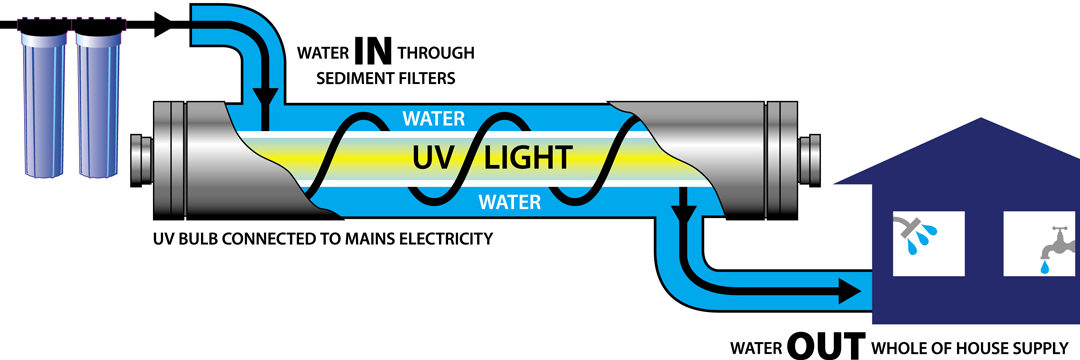Every living cell needs water and drinking chemical free water that has naturally fallen from the sky seems to be the most ideal solution to ensure we are providing the healthiest option for our bodies.
But rainwater, how it is collected and how it is stored, is not necessarily a pure way of providing our families with healthy drinking water.
In the early 1900’s, chlorine was added to water to help reduce waterborne diseases like typhoid, cholera, and dysentery. And while it has been attributed to increasing our average lifespan, there are many people who are dissatisfied with using chemicals that are subsequently consumed into our bodies. While there are many studies on the topic, whether or not chlorine contributes to cancer or is detrimental to our health, is still a debatable topic.
Waterborne diseases can be spread while bathing, washing or drinking water, or by eating food that has been exposed to infected water.
Ultraviolet – A natural combatant to waterborne diseases
Using rainwater or groundwater for your main water supply increases your potential for waterborne diseases to occur. In city/urban environments, where water is supplied through a central mains system, water is typically treated at it’s source, with pipelines flushed/maintained regularly to ensure there is limited potential for waterborne diseases to spread.
Chlorine is the typical chemical used to control waterborne diseases. Both in an urban setting, and for rural water storage. However, it is not the only solution and is far from being natural.
Ultraviolet (UV) sterilization systems are environmentally friendly and a natural way to ensure your water supply is safe to drink. UV sterilization was used in the early 1900’s, but was unreliable and required a lot of energy. Hence chlorine became the main source for disinfecting.
Technology has improved in recent decades, and UV has experienced an increase in acceptance as a primary method in naturally disinfecting water.
Using UV systems is an effective disinfectant due to its strong inactivating (germicidal) ability. UV disinfects water containing bacteria and viruses and can be effective against protozoans like Giardia lamblia cysts or Cryptosporidium oocysts.
How do Ultraviolet Sterilization systems work?
UV radiation affects microorganisms by altering their DNA, and impeding reproduction. The UV treatment doesn’t remove the organisms from the water, it merely inactivates them. The effectiveness of this process is related to exposure time and lamp intensity as well as general water quality parameters. 99.99% of microorganisms are rendered inactive with a functioning UV system.
Since lamp intensity decreases over time with use, lamp replacement and proper pre-treatment are key to the success of disinfection. It is recommended that lamps are replaced every 12-months, with the rest of the system
UV systems should be equipped with a warning device to alert the owner when lamp intensity falls below the germicidal range and an essential requirement for UV disinfection with lamp systems is an available and reliable source of electricity.
Used alone, UV does not improve the taste, odour or clarity of the water. An effective system will have filters included (before the UV) to strip any solids (sediment) to then allow the UV system to attack microorganisms. These filters can also be used to improve the taste.
With the right filtration/UV system in place, you can remove all sediment down to 0.5 of a micron (a millionth of a meter) and 99.99% of bacteria. In addition, if you have issues with odour or taste, the right filter system can strip this down for a more natural results.
Like to learn more about Ultraviolet sterilisation systems?
Pristine Water Systems provide water tank cleaning and filtration supply and services. If you would like to discuss whether or not you could use an Ultraviolet sterilisation system for your drinking water, call us today on 1300 364 858 or click the button below to learn more.
Looking for a water filtration system or replacement filters?
Pristine Water Systems looks after your water management, from the tank through to your taps.
We have a wide range of popular water filtration, ultraviolet sterilisation and replacement filter cartridges and parts. Our expert water technicians can help you select the right filter for your situation.
Visit our shop to view our range


